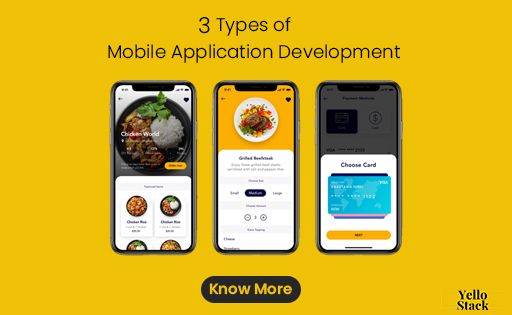3 Types of Mobile Application Development?
Mobile Application Development is the process of building an app for Mobile Devices and other digital gadgets, designed for end-users. A Powerful process-based application built to solve everyday business needs. It can be executed through Online- Web Browser, offline – Desktop App, Smartphone – Mobile App, Smart Tv and other smart electronic gadgets.
Application – The action of putting something into operation.
Classification of Mobile Apps:
Mobile Application Development is classified into 3 different types based on their quick functionality, responsive design and performance reliability.
1.Native Apps,
2.Hybrid Apps,
3.Web Apps
Factors to consider before choosing a Mobile Application Development :
The following factors to be considered, before Moving further into app development. Choosing the best app for you is purely based on your business objective.
- How Quick the App should be.
- The quality of UI, UX the app should have based on Audience Type.
Classification of Mobile Application Development:
Classification of mobile application development
A mobile app is basically a software program built to perform specific tasks on the mobile device.
- Native Mobile App:
Native Mobile applications are the most common types of Mobile Application Development. This involves building up a specific app on a specific platform with a specific Code for a particular Mobile Operating System. Native apps can be accessed by the end-users through exclusive online app stores such as Google Play & Apple Store, etc.
It is built upon Platforms:
a) Xcode, Swift and Objective C for Native iOS Apps
b) Java or Kotlin for Native Android Apps
c) .Net for Windows
d) Its is also built upon Integrated Development Environment -IDE for Selected OS.
*Native App is Fastest in Performance when compared to Hybrid and Web Apps.
*Each OS use their own development tools and interface elements.
Better and secured file storage even during offline.
Has remarkable UI/UX Designs.
It comes with inbuilt geo-location and interactive push notification.
The fully native application gives you high-quality outputs and an awesome experience.
Native Applications Advantages:
Responsive websites with multi-functional features such as better offline performance and user engagement activity and speed as supported by browsers like Google Chrome, Mozilla Firefox, Opera, etc. These web browsers treat the native mobile application functions as their home screen icons, push notifications and offline access.
- Web Application:
Web app is developed to deliver seamless user experience on Mobile apps.
A Web Application is also called as Client-Server Software Application in terms of how it performs in the Web browser. In general, the web application is stored in a remote server and delivered through the web browser interface.
In addition to the information in the regular web pages, web apps provide extra user functionalities like Offline working interface, Push Notifications and access to device hardware as in Native mobile app.
Web applications are the responsive versions of websites, which can work on any mobile device or OS as they are delivered through a mobile browser. The mobile app works effortlessly on Android, iOS, Windows Tabs, mobile devices and also on the PC web browser.
*It is developed on Software such as HTML, CSS, JavaScript, JQuery.
- Hybrid App Development:
If an App is a mix between Desktop Application and Web Application, it is called as Hybrid Application.
The best part of Hybrid App Development is it works across multiple platforms and active just like a native application. Hybrid App combines the elements of Native app and web app together. This type of app is similar to the native app when installed on a device but it is still a web app.
*Hybrid apps are built upon HTML, CSS, JavaScript.
The hybrid app is designed for multiple platforms so, it doesn’t require source code of any device it is gonna be installed or the Operation System.
The crucial functionality of Hybrid app is it has an offline desktop interface and direct access to hardware and other device and also connected with internet resources for quick updates.
Advantages of Hybrid Apps:
The Hybrid app is easy to build
Much cheaper and faster to develop than native apps
Just a single app is sufficient for all platforms.
It does not requirer any dedicated browser
Can access device internal functionalities and hardware using Application Program Interface.
Few Popular Categories of Mobile Apps Are:
Gaming Apps – Catching the leisure time with Adventure & mind engaging games.
Business Apps – Increase productivity and reduce expenses.
Educational Apps – Making teaching & Learning process simple and more fun.
Lifestyle Apps – Includes fitness, food, shopping and many more lifestyle experience to users.
Entertainment Apps – Make user engage with entertainment shows and fun factors
Utility Apps – Get things done easily at a press of a button, such as paying utility bills, fix up doctor appointment etc.
Travel Apps – Locate route guide to users, book tickets and make travel more comfortable.
Conclusion:
Web/ Native/Hybrid: Which is the Best app for you?
Confused? Don’t worry, we will help you to select a suitable app based on your business requirement. Contact – Yello Stack the leading Mobile Application Development Company in Saudi, Bahrain, UAE. A global expert in building the custom app on specif platform, design and development. We ensure our apps meet your business goals and delivered within your budget, timeline and functionality.
#mobile #app #development #ecommerce #website #branding
